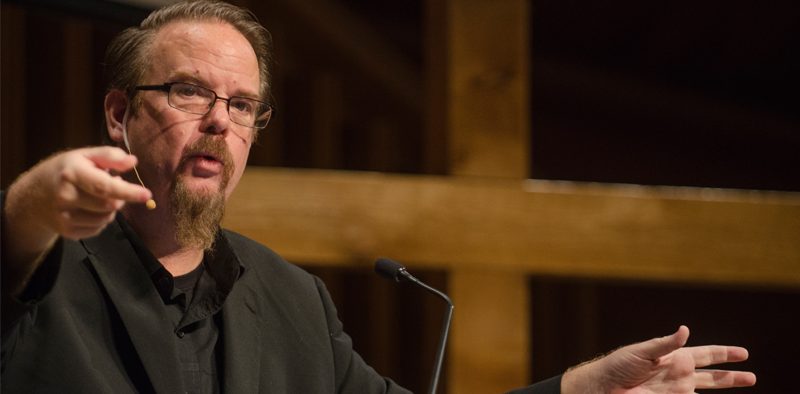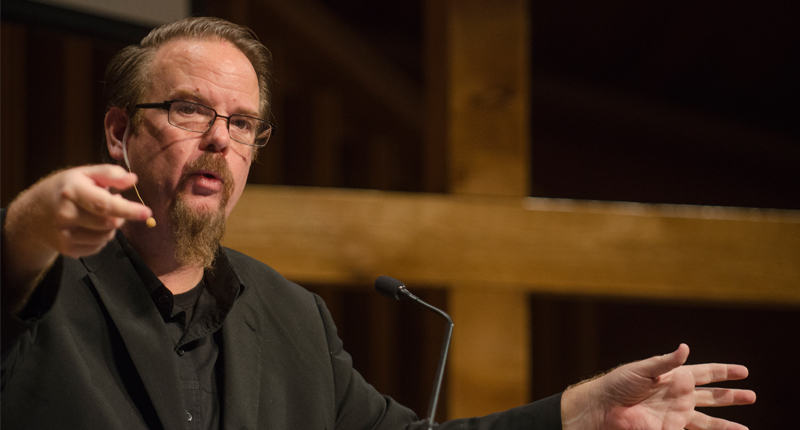Foreign Missions, Support Raising, and Missiology
A Conversation with Ed Stetzer

Editor’s Note: I’ve been writing a lot of stories about the Bible translation industry. One of the things that I’ve discovered about the Bible translation organizations is they are closely associated with mission organizations, and questions of missiology show up on lot.

Another issue that shows up a lot, an issue that is related to both of these organizations, is the practice of support raising.
So I want to talk with Ed Stetzer, who knows a lot about these topics.
Ed Stetzer has a list of titles and accomplishments too long to recount here. I’ll just say that he is the Billy Graham Distinguished Chair of Church, Mission, and Evangelism at Wheaton College and Executive Director of the Billy Graham Center at Wheaton College.
Warren Smith: Ed, the Bible clearly says, “Go.” We are to go into all the world and preach the gospel, to teach all things that Christ has commanded. We have this very clear directive from scripture. And we went. As Christians, we went for 2000 years, but now I’m wondering if we should reexamine that command, or to ask what it means to be obedient to that command. Because Christians of generations past went, we now have really smart, godly, well-trained people all around the world right now. Might it not make more sense to throw them a few thousand dollars and let them do their work, rather than raise hundreds of thousands to put an American missionary in the field? Someone who doesn’t know the language or the culture and might need years before he or she is truly effective?
Ed Stetzer: It’s a strategic question. I think theologically there’s still the call to go. But strategically, it may be more beneficial to send money than people. How do you walk that path?
Increasingly, people are seeing and saying that we still have that obligation. There should be people from the West who are going to the majority world and showing and sharing the love of Jesus. But we also know that people from the majority world are already there. That’s reality. And in a lot of places saying, “Hey, I’m from America and I’m here to be a missionary” is not the best look either.
So a lot of mission agencies are prioritizing areas where other missionaries are not. Also, people from high resource places sometimes come in as missionaries and tend to take over. So a lot of mission agencies, if they do send missionaries, put them under the authority of local or national leadership in the country they are sent to. That’s often called a “secondment.”
That said, I totally get what you’re saying. It is tricky, though. As a missiologist, I say that the theological reality is that we are still called to go. From a strategic and financial point of view, I know we can sometimes support as many as 50 local pastors for what it costs to send one from the West. I think we can and should do both.
Access to MinistryWatch content is free. However, we hope you will support our work with your prayers and financial gifts. To make a donation, click here.
WS: So one model is to go. Another model is to send resources. The hybrid is to send people, but perhaps people with specialized skills, as consultants, under the authority of local or national leaders.
Are those the models? Are there others worth consideration?
ES: There may be others that emerge. But I think the big debate now in missions is whether to go to places that have never heard the Gospel, to plant seeds, or to so-called “harvest fields,” places where the Gospel has been known, but the harvest is not great.
Or places like Brazil, where great things are happening. Maybe the strategy should be to go where God is moving and accelerate that process, or provide depth. If you go to Brazil, you will see a Neo-Pentecostalism which is not like the Pentecostalism you and I would know and appreciate. This form of Neo-Pentecostalism is almost shamanism. So perhaps we should send people there who are expert in theological education or even publishing.
WS: So “both-and”, not “either-or.”
ES: I don’t know how theologically you could not get to that point. The issue in the American church is not which strategy is best. It is that we need to get engaged more in global missions. And then we could easily resource both of these strategies.
WS: Get people off the sidelines doing one or the other.
ES: It would be a win either way.
WS: Ed, I don’t mean to go down a rabbit trail here, but one of my favorite passages in scripture is the story of Jesus delivering the demon-possessed man. Fast forward to the end of that story. The man is clothed and in his right mind, the Bible says, and he wants to follow Jesus, but Jesus tells him he can’t follow. Sometimes following Jesus means doing something that doesn’t look like following him, like staying behind.
ES: You’re probably the only person I know who that’s their favorite passage.
LAUGHTER
ES: But I take your point. That’s right. It’s doing what God is calling you to do. I mentioned Brazil. The presence of the International Missions Board [of the Southern Baptist Convention, the denomination’s foreign mission organization] in Brazil was significantly reduced, but it is more strategic. The IMB presence in places that we should not say on a recording is significantly increased.
My church sent a missionary to Brazil through the IMB. And we’re seeing more of that. Churches say, “We want to send.” So mission agencies have evolved. You’ll find missionaries who go through a denominational mission agency, but are primarily funded by one local church.
Cru [formerly Campus Crusade for Christ] is the largest global mission agency in the world and that’s pretty much the totality of their model. I don’t think people are funded by Cru. They’re funded through Cru.
WS: That takes me to my next point, because Cru is not the only organization that uses that model. Navigators. InterVarsity. Most of the folks on staff with these organizations raise their own support. Most of the missionary agencies. Most of the Bible translation organizations.
Obviously there’s great power in the support raising model. That model allows an organization to tap into networks of people and get them involved in personal ways. They support people they have a relationship with. And in that sense, the missionary is not a burden to the mission sending organization. In fact, just the opposite. The missionary brings both himself or herself as a new missionary, and also the financial resources to support the missionary. That model can result in explosive growth, as we saw with Cru in the 70s and 80s.
But one aspect of this model frustrate me as I’ve tried to think them through: The mission organizations themselves are often less than fully transparent about how they report those funds. Let’s use Wycliffe Bible Translators as an example. It’s an organization that takes in $225-million per year in revenue. It says it spends less than 10 percent of its revenue on fundraising, which sounds great. But then you realize that the vast majority of the revenue coming to the ministry is from people raising their own support. So why should the parent organization be spending that much money on fundraising? And where is the time and money that the individual missionaries spend being accounted for. How much money spent on fundraising is simply unaccounted for?
ES: A lot. I’ve raised my own salary three times. It’s a lot of work. It is a lot of time. There’s travel back and forth. I’ve flown all over the country raising funds.
WS: So is this model obsolete?
ES: The opposite. I think this is increasingly what people are moving to. The internet has changed everything. It’s the flattening of the fundraising process. In the past, if you were a Southern Baptist, you’d send your money to the IMB to support missionaries, and you’d never know who they were or where they were. Now everybody knows everybody. We have zoom calls with our IMB missionaries.
My concern is that all this takes place all outside of supportive systems and structures. It’s a little like a wild west of poorly trained missionaries going around who don’t understand culture and are burning bridges that other more responsible missionaries and organizations need.
I’m an institutionalist. You probably know that. So I think it’s better that organizations like Mission to the World [the Presbyterian Church in America’s international mission organization] or IMB send missionaries. When our church’s missionaries went to Brazil, we sent them through IMB. IMB wasn’t sending missionaries to Brazil, but these missionaries felt called to Brazil. So we said, “Can we go through the system?” They get the IMB training and support. We’ll pay the money. So we paid. So there is institutional inertia, and that has caused entrepreneurial individuals to want to go outside the institutional system, but some combination seems to work best.
WS: That brings me to another thing I find frustrating about the support-raising model. Let me start by saying that as I get older, I become more of an institutionalist myself. When I was 20 years old, I thought denominations were evil. They were not biblical. They were human inventions. But now I see that denominations keep…
ES: They keep people from going too crazy.
WS: Exactly. They provide guardrails. They keep us on the road, so to speak. So let me advocate for the institution for a moment. In an organization in which the individual missionary can pick up his support team and go home, or go to another organization, how can an institution and its leadership set strategy? How does the leader of a large mission organization get people to do something when, at the most fundamental level, those people do not work for him? They do not depend on him or the organization for their paychecks.
ES: First of all, I think it’s harder than you say it is to simply pick up your support team and move to another organization. When I raised funds, I had the stamp of approval of the North American Mission Board. That gave me credibility. If I had left, I would have had some significant explaining to do. I probably would’ve lost a good amount of my support.
But, yes, I’ve seen that happen. When Southern Baptist had a shift in strategy to unreached areas, many missionaries joined another mission board or went direct support. So yes, that can happen. But I think most people who affiliate with a mission organization do so for a reason. They realize there are more positives than negatives, and they try to make it work.



